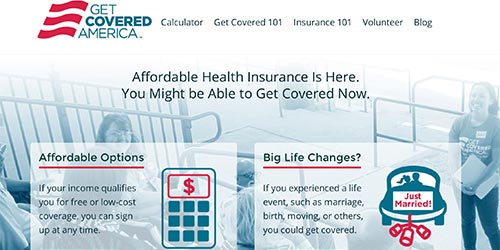By AJ Trager

MICHIGAN – The second round of open enrollment for the Affordable Care Act (ACA) is about to begin in Michigan, and the campaign "Get Covered America" is working hard to get the word out to the LGBT community and the statewide constituency at large.
Erin Knott, the Michigan state director of Get Covered America, was born and raised in Chelsea and came out as a lesbian when she was just 12 years old. Approaching 40, the Western Michigan University graduate of criminology worked in crime prevention post-college, looked into public safety and worked for community development by organizing funding resources for neighborhoods across the state. After the marriage amendment of 2004, Knott backed out of community development work. She has since gotten involved in Get Covered America, leading the Michigan team of roughly 4,000 staff and volunteers who connect with the state at large.
"Folks have been elated, because now they don't have to juggle rent and pills to treat diabetes," Knott said. "They aren't having to cut the dosage in half. They aren't worried about it as much. Folks we are connecting with are enjoying the fact that they have coverage, and for the fist time in many, many years, they can go to the doctor and get a prescription."
Since October of 2013, over 700,000 Michiganders have received medical health care coverage through the Marketplace, Medicaid and CHIP program. Of the 272,000 Michigan consumers who selected a plan through the Marketplace, 87 percent received financial assistance to help pay for the plan. Two years later there are now 16 different insurance companies that offer individual plans at different levels of coverage. The marketplace is a one-stop shop portal that helps to increase competition because consumers can now pick side-by-side comparisons that best fit their lifestyle and shop for the plan that best fits their budget.
"As a non-partisan, non-profit group, we don't get into the politics of this. That said, we know that the ACA is often used as a political football, with a lot of deliberate misinformation pumped out there by opponents and others who have an interest in do that. Get Covered America is laser-focused on getting consumers the facts about their new health coverage options, " Shawn Dhanak, the communications lead for the Michigan team, said.
When Knott started this journey last summer with Dhanak, the ACA was the law of the land and she thought that the narrative should focus on consumer benefits and not the political atmosphere that was weighing down the ACA conversation. Since it was law, it was time to make it work for the consumer. She focused on raising awareness for deadlines, focused on talking to people who thought they were one accident away from not having any insurance and worked to inform the uninsured.
The second enrollment period starts on Nov. 15 and will run until February of 2015. Michiganders can currently sign up for coverage, but those plans will expire at the turn of the calendar year. The Medicaid program, "Healthy Michigan," has been expanded and a significant amount of money has been awarded to community health centers for health insurance to be issued to the homeless.
"We are working with those health centers, we are helping to enroll people. These are very critical resources that serve the community," Knott said. "Field staff and volunteers are going to soup kitchens and food pantries all in an effort to reach as many people as possible."
In a 2014 Gallup-Healthways Well-Being Index Poll, LGBT people were anywhere from 8 to 10 percent more likely to be uninsured or lack a personal doctor than their straight counterparts. They also experienced more hurdles accessing health insurance and resources.
"We are aware that the LGBT individuals have long faced barriers for obtaining health care. We know that the community faces higher rates of non insurance and discrimination in the healthcare system," Knott pointed out. "I know several lesbian women who have not sought out health screenings because of that stigma or the fear of being discriminated against. I have tried to train staff and volunteers in LGBT history and the experience among the LGBT community by raising awareness when working with folks."
Get Covered America has partnered with the LGBT agencies across the state, including KGLRC, Affirmations, CARES and One Royal Oak to kick off the awareness campaign and get LGBT people the health care that they need. The campaign has been at a number of pride events and has been active in the LGBT community meet-ups and professional networks that convene on a monthly basis to connect with people.
The first open enrollment period garnered 272,000 Michiganders who now receive health insurance. This is now the time to renew one's health insurance policy. That could be as easy as getting a note and sending it back, or as Knott suggests, visiting the marketplace to see what kinds of new plans are available. Up to 87 percent of those who enrolled in the last term received financial assistance, and since then, more opportunities have been added for the coverage of transgender health care.
New patient protections have been added such as lifetime limits on coverage, staging out annual limits and forgiveness of preexisting conditions, which guarantees coverage for HIV positive individuals even if they lose their jobs.
In September, Get Covered America partnered with Michigan House Representatives Adam Zemke of Ann Arbor and Phil Phelps of Genesee to lead the outreach effort and target more demographics in the state. In the past year, the campaign has worked with U.S. Rep. John Dingell and U.S. Rep. Sandy Levin to amplify the message to consumers.
The U.S. Department of Human Services found in August that the price for the silver plan for the average consumer was just $85, which brought the cost of coverage down substantially and has made the coverage affordable for consumers. Despite the huge success of the first open enrollment, there are still roughly one million uninsured Michiganders.
"If you have a life changing circumstance, don't make assumptions; go to healthcare.gov or call 800-318-2596 and talk to the support staff," Knott said. "We want to help consumers know that this is the law and that there are many consumer protections and tax credits that make ACA affordable for consumers across the state."










